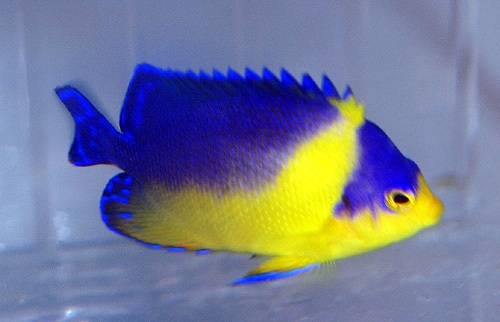Venustus Angelfish – (Paracentropyge venustus)
Quick Stats:
- Care Level: Moderate
- Temperament: Semi-aggressive
- Diet: Omnivore
- Reef Safe: No
- Minimum Tank Size: 50 gallons
- Max Size: 6 inches
- Water Parameters: pH 8.1-8.4, Salinity 1.023-1.025, Temperature 72-78°F
Venustus Angelfish – (Paracentropyge venustus)
The Venustus Angelfish, scientifically known as Paracentropyge venustus, is a beautiful species commonly found in the Indo-Pacific region. It inhabits shallow coral reefs and lagoons, where it feeds on a variety of small invertebrates and algae. Although it is not considered reef safe, it can be kept in a well-planned saltwater aquarium with caution.
Size-wise, the Venustus Angelfish can grow up to 6 inches in length, making it a suitable choice for smaller to medium-sized aquariums of at least 50 gallons. It has a semi-aggressive temperament and may display territorial behavior towards similar-looking species or other angelfish.
Sexual dimorphism is not prominent in this species, making it difficult to visually determine the gender. The lifespan of Venustus Angelfish in captivity can reach up to 10 years or more with proper care.
In aquariums, the diet of Venustus Angelfish should consist of a variety of high-quality marine-based foods, including frozen or live brine shrimp, mysis shrimp, and spirulina-based flakes or pellets. Offering a mix of vegetable matter and protein-rich foods will help maintain their overall health and vibrant coloration.
Aquascaping recommendations for Venustus Angelfish include providing plenty of hiding spots with live rock or coral formations. This will not only offer them shelter but also mimic their natural habitat. Care should be taken to ensure the tank has enough open swimming space for them to maneuver.
Currently, Venustus Angelfish is primarily collected from the wild and not commonly available as captive-bred specimens. However, efforts are continuously being made by marine ornamental fish breeders to breed them in captivity to reduce the pressure on natural populations.
When considering tankmates for Venustus Angelfish, it is important to choose species that can tolerate its semi-aggressive behavior and similar water parameters. Some suitable tankmates include:
- Yellow Tang – Their peaceful nature and ability to help control algae make them a good choice.
- Coral Beauty Angelfish – They have a similar appearance and can coexist with the Venustus Angelfish.
- Firefish Goby – Their peaceful nature and vibrant colors make them an attractive addition to the tank.
- Banggai Cardinalfish – Their unique appearance and peaceful behavior make them suitable tankmates.
- Green Chromis – They are schooling fish that can add movement and color to the aquarium.
Other common names that the Venustus Angelfish may be known by include “Venusta Angelfish” or “Eibli Angelfish”.
People should consider buying from Reefs4Less.com for their saltwater aquarium needs due to their extensive selection, competitive prices, and reliable shipping service. They have a wide range of high-quality marine fish, corals, and equipment, ensuring a positive shopping experience for hobbyists.
Popular Questions about Venustus Angelfish – (Paracentropyge venustus) in Saltwater Aquariums:
1. Can Venustus Angelfish be kept in a reef tank?
No, Venustus Angelfish are not considered reef safe as they have a tendency to nip at corals and other invertebrates.
2. How big do Venustus Angelfish grow?
Venustus Angelfish can grow up to 6 inches in length.
3. Are Venustus Angelfish aggressive towards other fish?
They have a semi-aggressive temperament and may display territorial behavior towards similar-looking species or other angelfish.
4. What is the lifespan of Venustus Angelfish in captivity?
With proper care, Venustus Angelfish can live up to 10 years or more.
5. What is the ideal diet for Venustus Angelfish in aquariums?
Venustus Angelfish should be offered a varied diet consisting of high-quality marine-based foods such as brine shrimp, mysis shrimp, and spirulina-based flakes or pellets.
| Size | < 2 inches |
|---|


Reviews
There are no reviews yet.